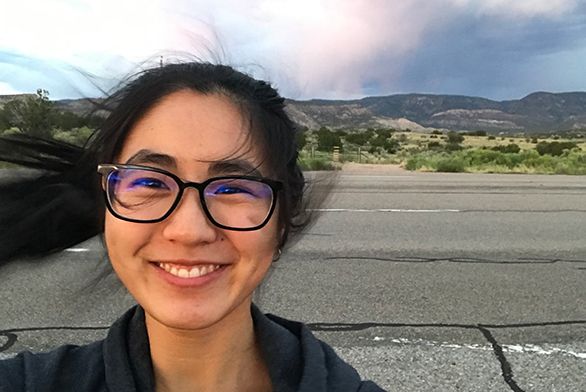Bridget Wu (SF20) Senior Essay
May 22, 2020 | By Hannah Loomis

Where are you from?
I was born in the United States and grew up in Shanghai, China.
Which book did you write on?
I wrote on Plato’s Republic, which is my favorite Program book. Anytime I post a picture of my bookshelf, there are always comments about my four copies of the Republic. My excuse is that the extra copies were gifts and my go-to copy will soon be so marked up that I’ll need a new one.
What’s the title of your essay?
“Receiving Poetry Back from Exile: Poetry as a Friend to Philosophy in Book X of Plato’s Republic”
What was the essence of your argument?
At the very end of the Republic, Socrates bans poetry and all imitation from the city in speech because they are neither beneficial for regimes nor for human life. The argument indicates that poetry, as a kind of imitation, is opposed to philosophy. By the end of the Republic, it appears that poetry and philosophy’s quarrel is irresolvable and eternal. It seems that there is no possibility that poetry could be let into a good city nor that poetry should be heard by well-ordered souls.
Yet, there are details in the Republic that suggest the ban is not absolute. That is, there might be a way in which poetry could be allowed back into the city and be friends with philosophy. My paper begins by claiming that Book X of the Republic is a contradiction, because Socrates’ banishment of all imitation means that the Republic itself, which is Plato’s imitation of Socrates’ recounting his conversation from the previous night, would also be banned. The banning of imitation is not only a banning of poetic imitation, but also of philosophic imitation.
The paper examines the three arguments against poetry: that poetry is imitation, that it does not have knowledge, and that it is bad for the ordering of the soul. The paper argues that the criticisms raised against poetry are not actually criticisms, but in fact support the existence of philosophic poetry.
How did your essay connect to the different aspects of the Program from throughout your four years?
The Program has been teaching me how to read carefully and think well. The St. John’s education is built on this idea that there are Great Books that contain true claims about the world and human beings, whether it be in philosophy or religion or math or poetry. It is our job at the college to investigate these truth claims. It is pretty clear to me that the truth claims are not limited to the philosophic works, and it seemed to me very disappointing that we were perhaps leaving the Republic by throwing our hands up into the air and saying, “Well, if I want to find truth then maybe I just shouldn’t do poetry and literature.” It was strange to me that this foundational text in Western philosophy was thought of as justifying a split between all poets and all philosophers. My paper is specifically about poetry and philosophy in Book X of the Republic, but it is also about how we find truth and what account we might have for saying that there is philosophic truth to be found in literature and poetry.
What was the writing process like for you?
The writing process was a lot of very, very slow reading and thinking. We rarely have the opportunity to sit for so long with a book and truly distill our thoughts into something clear and coherent. I focused on 14 pages of the Republic. The best things I did were writing many drafts, each of which was read and thoroughly criticized by my editors, and writing lots of commentary on Book X. It’s too easy to be complacent when reading Socratic dialogues, and it’s too easy to hide your work from the necessary and helpful criticism of others. The commentary kept me attentive while reading, which is to say that I was surprised and shocked by the dialogue. I caught many details in the text that I’ve missed on previous reads.
What is the most important lesson you learned during your time at St. John’s?
The most important lesson I’ve learned is probably to be neither dogmatic nor relativistic nor skeptical. Our relationship to knowledge is very difficult and lies in a lot of ambiguity. Our desire to know leads us into this fine balancing act where we have to accept that we won’t ever fully know but also that we do know more than we used to.

